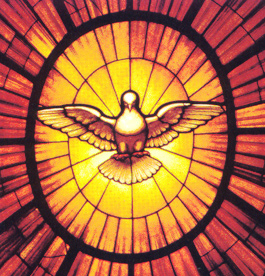
"Veni Sancte Spiritus", sometimes called the Golden Sequence, is a sequence prescribed in the Roman Liturgy for the Masses of Pentecost and/or its octave, exclusive of the following Sunday. It is usually attributed to either the thirteenth-century Pope Innocent III or to the Archbishop of Canterbury, Cardinal Stephen Langton, although it has been attributed to others as well.
Nunc, Sancte, nobis Spiritus is a Christian hymn which has traditionally been attributed to the fourth century St. Ambrose of Milan. However the earliest manuscript tradition for the hymn seems to only go back to the ninth century. The hymn has traditionally been a core part of the prayers at Terce in the Liturgy of the Hours. The reason for this is that the Acts of the Apostles records an event at Pentecost where the apostles are filled with the Holy Spirit. The experience clearly causes the apostles to behave in an unusual way and in chapter 2 verse 15 the Acts of the Apostles states explicitly that the apostles were not drunk because it was only the third hour of the day. As the Acts of the Apostles was so explicit in linking the Pentecost experience of the Apostles to the third hour of the day, Christian hymns and prayers intended to be used at that time of the day, have traditionally made reference to the coming of the Holy Spirit.
"Veni Creator Spiritus" is a traditional Christian hymn believed to have been written by Rabanus Maurus, a ninth-century German monk, teacher, archbishop, and saint. When the original Latin text is used, it is normally sung to a Gregorian Chant tune first known from Kempten Abbey around the year 1000. The hymn has been translated and paraphrased into several languages, and adapted into many musical forms, often as a hymn for Pentecost or for other occasions that focus on the Holy Spirit.

"Nun komm, der Heiden Heiland" is a Lutheran chorale of 1524 with words written by Martin Luther, based on "Veni redemptor gentium" by Ambrose, and a melody, Zahn 1174, based on its plainchant. It was printed in the Erfurt Enchiridion of 1524.

"Nun bitten wir den Heiligen Geist" is a German Christian hymn. The first stanza is a leise from the 13th century which alludes to the Latin sequence Veni Sancte Spiritus for Pentecost. It was widely known, and aside from its Pentecostal origin was also used as a procession song and in sacred plays.
"Veni redemptor gentium" is a Latin Advent or Christmas hymn by Ambrose of Milan in iambic tetrameter. The hymn is assigned to the Office of Readings for Advent, from December 17 through December 24, in the Liturgy of the Hours. John Mason Neale and Thomas Helmore saw it as an Evening hymn for the period from Christmas to the eve of Epiphany.
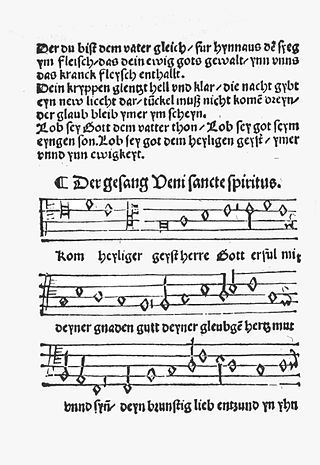
"Komm, Heiliger Geist, Herre Gott" is a Lutheran hymn for Pentecost, with words written by Martin Luther based on "Veni Sancte Spiritus, reple tuorum corda fidelium". The hymn in three stanzas was first published in 1524. For centuries the chorale has been the prominent hymn (Hauptlied) for Pentecost in German-speaking Lutheranism. Johann Sebastian Bach used it in several chorale preludes, cantatas and his motet Der Geist hilft unser Schwachheit auf, BWV 226.
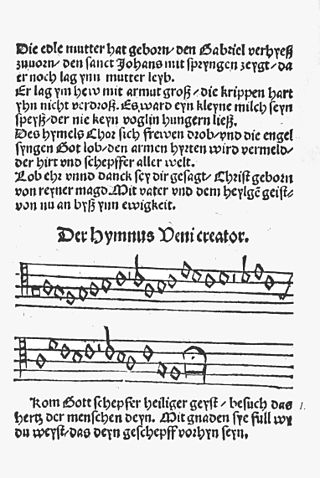
"Komm, Gott Schöpfer, Heiliger Geist" is a Lutheran hymn for Pentecost, with words written by Martin Luther based on the Latin "Veni Creator Spiritus". The hymn in seven stanzas was first published in 1524. Its hymn tunes are Zahn No. 294, derived from the chant of the Latin hymn, and Zahn No. 295, a later transformation of that melody. The number in the current Protestant hymnal Evangelisches Gesangbuch (EG) is 126.
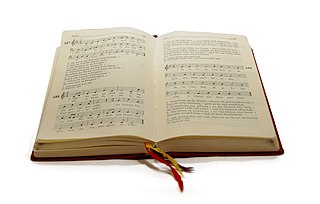
The 1975 edition of Gotteslob was the first combined prayerbook and hymnbook authorised by the bishops of all German-speaking Roman Catholics in Germany and Austria. It contains texts and songs for liturgy, communal prayer and private prayer, divided into a section which is common for all, and an appendix for the local songs in a diocese.
"Der Geist des Herrn erfüllt das All" is a Christian hymn for Pentecost by Maria Luise Thurmair, written in 1941. First printed in 1946, it appeared with a 1609 melody by Melchior Vulpius in the German Catholic hymnal Gotteslob in 1975 as GL 249. It has been included in ecumenical hymnals and songbooks.

"Macht hoch die Tür" is a German popular Advent hymn, written in Ducal Prussia in the 17th century. The lyrics were written by Georg Weissel in 1623, for the inauguration of the Altroßgärter Kirche in Königsberg. The melody that is now associated with the text appeared first in 1704 in the hymnal by Johann Anastasius Freylinghausen.
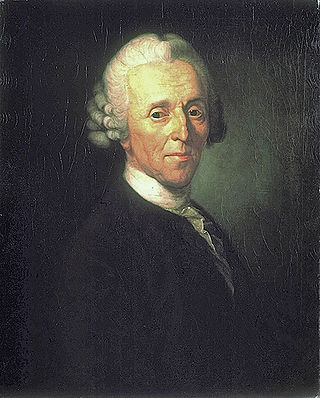
"Wenn ich, o Schöpfer, deine Macht" is a sacred poem in German by Christian Fürchtegott Gellert, titled "Preis des Schöpfers". It became a Christian hymn with an older melody by Peter Sohren. It is still popular and appears in hymnals including the Protestant Evangelisches Gesangbuch and the Catholic Gotteslob.
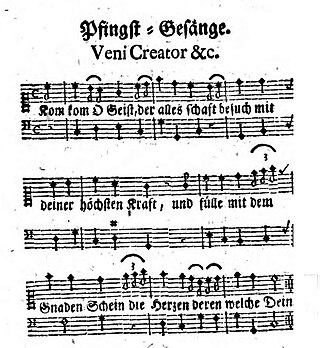
"Komm, Schöpfer Geist, kehr bei uns ein" is a Christian hymn in German for Pentecost. The text is a paraphrase of the Latin hymn Veni Creator Spiritus by Heinrich Bone. The melody is an adaptation of the Latin hymn's plainchant. It was first published in 1845. In the Catholic hymnal Gotteslob, it is GL 351.

Heinrich Bone was a German educator and hymnwriter. He wrote a reader for German studies which was used for higher education in Germany, Belgium, Luxembourg and Austria, until it was banned during the Kulturkampf. He published a hymnal, Cantate!, which was used by several Catholic dioceses and became a model for common hymnals. Some of his own hymns, including paraphrases of Latin hymns, are part of recent hymnals, both Catholic and Protestant, such as "Komm, Schöpfer Geist, kehr bei uns ein" as a paraphrase of the 9th-century hymn for Pentecost, Veni Creator Spiritus.
"Komm, Heilger Geist, der Leben schafft" is a Christian hymn in German for Pentecost. The text is a paraphrase of the Latin hymn Veni Creator Spiritus by Friedrich Dörr, with a 1524 melody. It was first published in the Catholic German hymnal Gotteslob in 1975.
Friedrich Dörr was a German Catholic priest and professor of theology, who is known as a hymnwriter. He shaped the first common German Catholic hymnal, Gotteslob, published in 1975.

Cantate! (Sing!) is a German Catholic hymnal first published in 1847, and continued in seven editions until 1879. It was a collection of 444 old and new songs, edited by the educator and hymnwriter Heinrich Bone, and the first Catholic hymnal in German that was used in multiple dioceses. Several of the songs are still part of the common Catholic hymnal in German, Gotteslob.
"Lob Gott getrost mit Singen" is a Lutheran hymn in German, a paraphrase of the Latin Te Deum, by the Bohemian Brethren. The hymn is part of the current Protestant hymnal. The hymn was translated into English as "Praise God, praise God with singing". The hymn tune was used for several hymns in different languages, denominations and centuries.
"O komm, du Geist der Wahrheit" is a Lutheran hymn for Pentecost in German. The text was written by Philipp Spitta, probably in 1827, and published in 1833 in the song collection Psalter und Harfe. It is a prayer to the Holy Spirit for courage to confession in a time poor in faith. The hymn which first appeared without a melody, is now usually sung to the 1529 melody of "Lob Gott getrost mit Singen". It is part of the current Protestant hymnal, and of other hymnals.
"Atme in uns, Heiliger Geist" is a Christian hymn for Pentecost, a song of the genre Neues Geistliches Lied (NGL) first created in Franceand published in 1982. The song was included in the 2013 Catholic hymnal in German, Gotteslob, and appears in songbooks.











